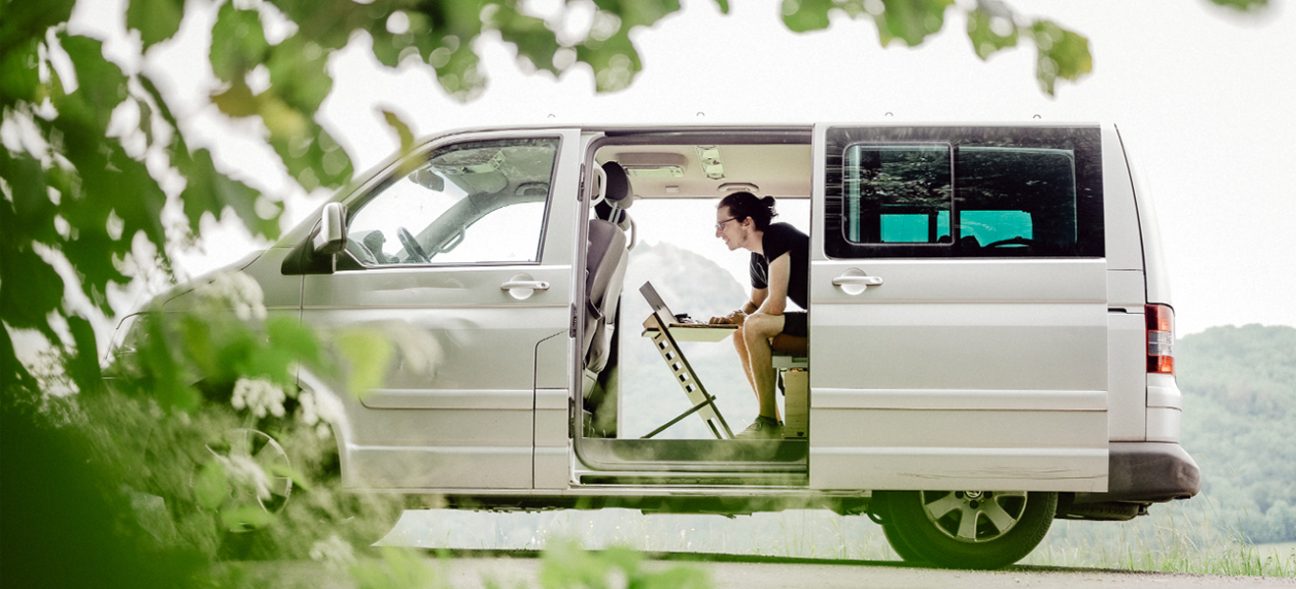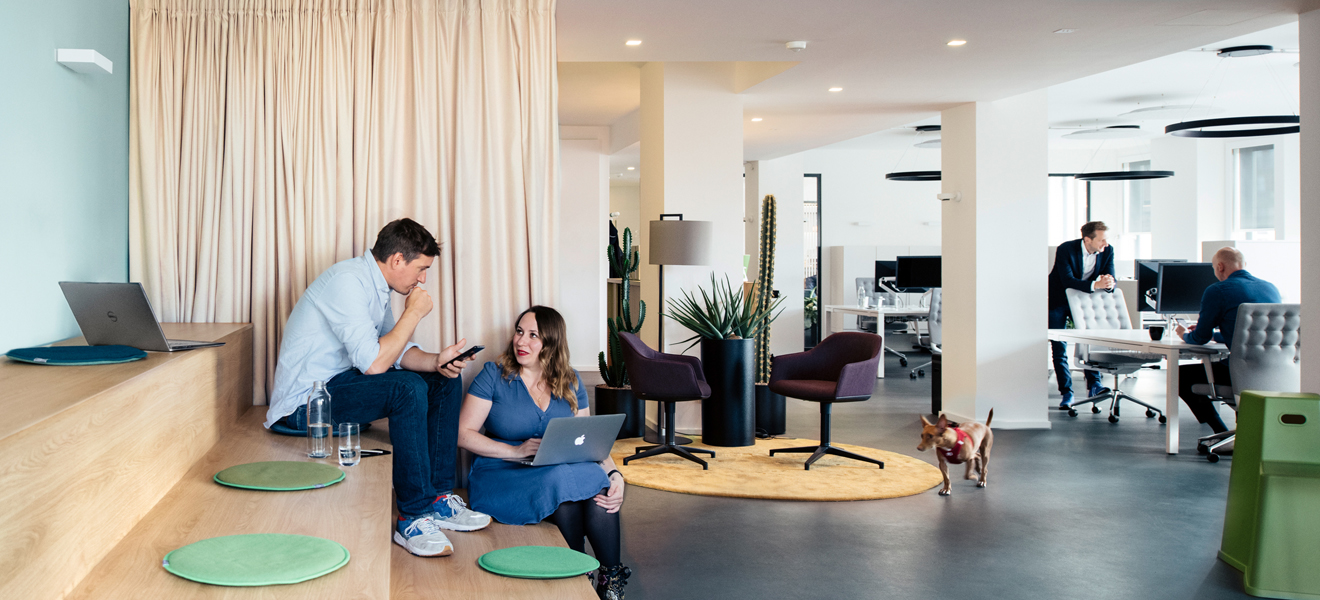Off to new shores! Some see workation as a fantastic opportunity to escape winter or to fulfil the dream of a trip around the world. Others, above all the travel industry, see promising perspectives for their business in this worldwide trend. Working guests like to stay longer and they have different needs than those who are simply on holiday. A new work facet with opportunities for many sectors, from the hotel industry and contract business to creative brands for home design and personal accessories.
See the world, stay where it is most beautiful and earn money at the same time – those who pursue this life concept used to work mainly in the travel or hospitality industry. In recent years, however, the picture has changed massively. More and more digital nomads, i.e. people who primarily use digital technologies for their jobs, lead a multi-local life and can increasingly be found in places where others go on holiday. The trend has also gained momentum from the Corona pandemic, in which many young people in particular preferred to spend their lockdowns in a holiday home by the sea rather than in their home office at the kitchen table.


Workation is a mixture of “work” and “holiday” and stands for bringing the two activities together. The trend corresponds to the concept of “work-life blending”, i.e. the blending of the professional and private spheres. And: interest in the topic is higher than ever worldwide. This is also shown by Google Trends: in 2021, search queries for the term “workation” increased by 247 percent compared to the previous year. International studies such as Travel Trends 2021 confirm this development: 43 percent of respondents are interested in workation. People are particularly enthusiastic in China, where the figure is almost 70 percent. Worldwide, 76 percent of respondents would extend their holiday by two or more weeks for a workation. The decisive criteria for choosing a location include stable and fast internet, a separate work area and available electronic equipment.
The travel industry has already adapted well to this development. Market leaders such as TUI, Robinsonclubs or specialised agencies such as OnWorkation offer attractive full-service packages to companies and privately interested parties: Dream destinations with high-end facilities for mobile working. Operators of hotels and holiday homes who want to profit from this trend are increasingly equipping their facilities accordingly. This includes not only technical features such as high-speed internet, power sockets, monitors, cables and printing facilities, but also co-working spaces, work cafés and ergonomic solutions.

One of these experts is the German company Vario, which is considered one of the most innovative office furniture manufacturers. The brand develops and manufactures particularly versatile solutions in its own factory, with which it meets the requirements of the New Work megatrend at its core. The modular system “M1”, for example, is specially designed for the creation of hybrid room structures – from complete work landscapes to individual micro-architectures that encourage working in a relaxed atmosphere. Multifunctional seating and zoning systems also give hotels the opportunity to set up attractive working areas in their own corporate design without much effort.
“After the rapid development of working from home in recent years, we are currently experiencing two parallel trends in the world of work: on the one hand, companies are very motivated to redesign the office as a space of versatile possibilities and a place of encounter. Places with added value are being created where people enjoy spending their working day. On the other hand, companies and employees have experienced that in many cases work no longer has to take place at a specific location. Thus, hotels all over the world are gradually becoming possible and almost fully-fledged places of work. Whether it is a workplace in the company, in a hotel or a coworking space – the services offered and also the spatial as well as organisational possibilities in terms of booking and catering are becoming more and more similar. We are not just seeing this development now: We have been preparing our product portfolio for this for some time now”, report the managing directors of Vario Germany, Matthias Kurreck, Anton Flechtner and Collyn Präkelt.

Not everyone is comfortable working in public spaces. So if peace and privacy are required, there is hardly any alternative to working from home – or rather “room office” – in the workation. The days of the mini side table with a low armchair in hotel rooms are thus numbered. Instead, workation travel providers advertise adequate equipment including a desk and comfortable chair. König + Neurath, for example, is specifically dedicated to the topic of work-life blending. With “NOOK.SHELL”, the internationally renowned brand recently launched an innovative version of a shell chair whose design can be individually configured for workspaces and private spheres.
Being different is popular. If there is little space or a desire for high flexibility, it is worth thinking “out of the box”. Here, the market has some surprisingly (ingenious) solutions in store. One of them comes from the German-Canadian manufacturer Country Living: its Alwin’s Space Box contains a hidden, solid table that can be extended to an astonishing 110 cm and disappears just as easily when not in use. This makes it a smart design element for workation-ready flats.

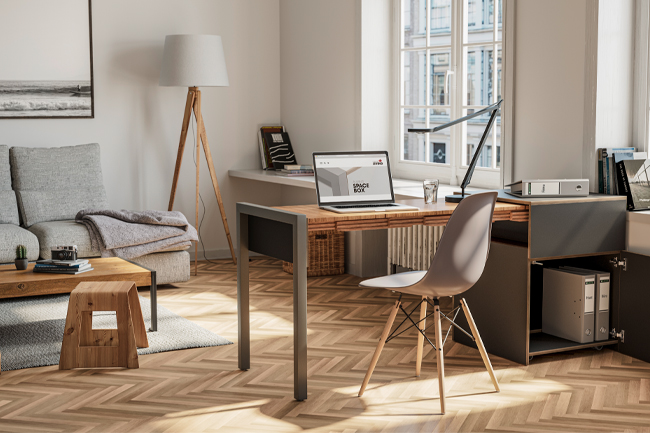
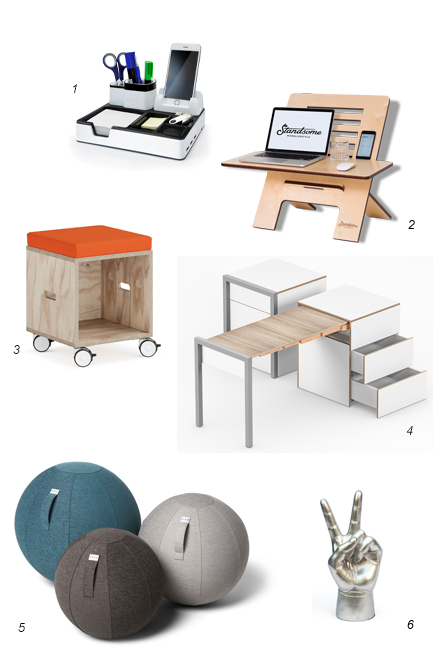
Good hosts think ahead and surprise their visitors with little everyday hacks. One of them is the Standsome. Originally intended as a substitute for a healthy standing desk, the laptop stand has become an all-purpose tool for digital nomads. For an extra shot of order, there are many smart solutions such as desk organisers in mini format or headphone holders as design objects. When it comes to healthy sitting, it doesn’t always have to be the classic office chair. Modern seat balls are not only a chic eye-catcher. Unfilled, they are easy to store, can be taken on trips and are ready when guests want an ergonomic seat.
„Remote first!“ – Interview with Oliver Kremers
Especially for Millennials (Gen Y) and Post-Millennials (Gen Z), mobile work and workation are increasingly becoming must-haves. An EY survey shows: Nine out of ten employees want flexibility with regard to the time and place of their work and even 50 percent of younger employees would quit if they were not offered a flexible work location. On the other hand, not all youngsters are equally enthusiastic about remote jobs or workation. Many can work better in the office, want personal contact and want to clearly separate private and professional life. The bottom line, however, is that international HR experts agree that workation can be a great benefit and that local independence can mean a gain in quality of life, productivity and work motivation.
Oliver Kremers agrees. The marketing expert and entrepreneur founded the start-up ChatWerk. His mission: to make messenger communication simple and affordable for small and medium-sized businesses. The kick-off meeting took place in the middle of the Corona Summer 2020. Online, of course. For the founder, mobile working is clearly a recipe for success.

Until now, your company has never had a shared office. Why?
“Remote first” was our motto from the very beginning, because the right people don’t necessarily live on your doorstep. Our four-person founding team alone comes from Berlin, Dresden, Cologne and Saarbrücken. As a corporate start-up, we are part of the Müller Medien family of companies from Nuremberg, where we also don’t have a permanent office. In the meantime, we have ten smart people, work together with a European team of developers and freelance creatives – and are thus even more scattered.
How do you organise the collaboration?
Most of us work from home. But if we want to, we also look for co-working spaces. We rely on self-motivation and reduce meetings to what is necessary. We do not need instruments such as time recording or something similar. The commitment of the team and the visibly high productivity speak volumes.

What is the difference between working from home and workation for you?
To be honest, there is no significant difference for me, as we are set up for a very free and location-independent way of working anyway. We have colleagues who regularly commute between two or three locations. The only thing I notice is the changing backgrounds on the screen.
How do you deal with the issue of workation in organisational terms?
With us, everyone organises themselves. If help is needed, we find a solution. One issue, for example, is accessibility, i.e. the time zone. For our colleague with Brazilian roots, for example, workation is the chance to see his family over a reasonable period of time. That’s why we have designed his job in such a way that it hardly requires traditional office hours. For those who like to travel, we offer something similar. Why not spend the winter in a more summer-like setting? This freedom motivates and that benefits the whole team.

Equipment for digital nomads
If you are on the road a lot, you need the right equipment. Resourceful manufacturers have recognised this and are surprising us with smart product ideas. These include neck rests that become tablet or laptop holders, cushions that cool the computer from below, or refill bottles and lunch boxes for sustainable self-sufficiency. But travel utensils and the good old notebook also continue to have their place. Because if you travel, you have to expect to be offline from time to time. “Modimo” by Giuseppe di Natale is a sustainable and reusable notebook with a regenerated leather cover and two refillable journals, perfect for analogue to-do lists.

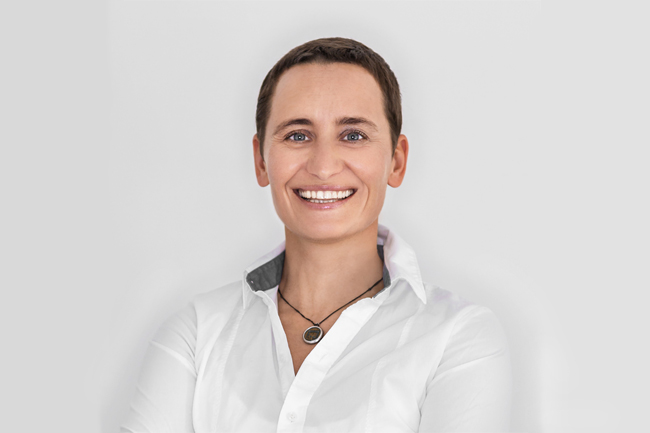
Workation and whales – interview with Marion Hentschel
So we packed our suitcases and headed off to workation. But where to? Those who want to work abroad should keep a few aspects in mind, such as time zones, infrastructure and individual recreation factor. According to the travel industry, destinations such as Portugal, the Canary Islands, Madagascar, Spain, California or the Seychelles, but also Bulgaria, Finland or Austria score points here, depending on requirements, budget and sun hunger.
One destination that is permanently en vogue is South Africa. The trend is rising sharply. Marion Hentschel also confirms this. She founded her travel agency SALT Concepts in Cape Town in 2008. SALT Concepts focuses on sophisticated corporate events, incentives and MICE business and works with a large network of selected suppliers. Since 2011, she has also been planning tailor-made individual trips to the whole of Southern Africa for private clients.
Through your business branch, you work very closely with the New Work trends. When did the topic of workation first come up for you?
South Africa is ideal for digital nomads who live and work here on a temporary basis. The workation trend therefore showed up quite early, around 2016/2017. One of the reasons for this was that Airbnb moved away from pure sofa surfing and repositioned itself during this phase. Suddenly, there were lots of beautiful and affordable flats that could be rented for a longer period of time. The current boom started in 2018/2019 and the rest – it’s fair to say – was done by the Corona pandemic. In the global lockdowns, the topic of mobile working has taken on a whole new dimension, making much more possible than before 2020.
What makes places like Cape Town so attractive for workation?
These are strong arguments: the time zone – we only have a one-hour difference during the European winter – and the good infrastructure. For the 2010 World Cup, fibre optic cables were laid all over the place, giving us fantastic high-speed internet in many areas. Then there are the attractive flats and co-working spaces spread all over the city. This means I can set up my quarters in almost any neighbourhood and network with a vibrant international community. In addition, many visitors also appreciate the European atmosphere, which makes the transition to the new working environment quite pleasant.

Who is targeting you? More private individuals or companies?
At the moment, we receive more private enquiries, especially from self-employed people who have actually always been able to work location-independently. What we think has changed is the proportion of those who are now actually taking advantage of this opportunity.
What do interested parties need to bear in mind?
It is important to note that the tourist visa in South Africa is limited to three months, and that you are not allowed to work for a local company with it. Currently, the introduction of a six-month visa for digital nomads is discussed. Ideally, one should inform oneself about aspects such as these. And one thing is clear: a country like Africa always means a bit of adventure. Here, for example, we struggle with the energy supply, power cuts are commonplace. Therefore, it is very important that the respective locations guarantee a one hundred percent power supply. That is not always the case. Therefore, no matter where we are going, I recommend planning with local travel providers who know the local conditions well.
“Work” is one side, “holiday” the other. What do you recommend to people who want to combine both?
In any case, I should think about what is really important to me beforehand and allow time for sightseeing, enjoyment and travel. Do I prefer nature or urban feeling? How important is a view of the sea to me? How much local charm am I looking for? It is also good to decide what I really want to see. From Cape Town, you can make a number of wonderful smaller excursions, for example to the Winelands, but there are also the Victoria Falls or the Kruger National Park. You will never be able to do everything during one stay. That’s why I recommend making a top-down list for each workation and book parts of it in advance. Otherwise, one online meeting follows the other and I go home without having seen the Big Five.

Header image: Standsome
